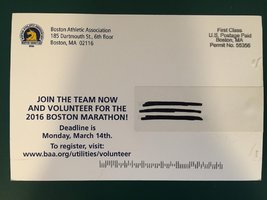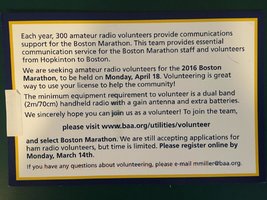I was on the tech chat last night on the MMRA network and was talking to KB1OQA about what is involved in working the Boston Marathon or even the Ashland Half Marathon.
I had many questions that I didn't want to ask as it would derail the net.
1. I don't drive, but could get down to one of these events...is that a deal killer if I can't drive?
2. My understanding for the Boston Marathon is that they use the MMRA repeaters. Are the repeaters linked or do they use separate repeaters for different functions?
3. How long of a day do you typically work on the marathon?
4. Do they feed you or do you have to bring a lunch?
5. The topic of transportation buses was brought up and that they have Hams working on each bus to coordinate movement. Are you expected to bring a mag mount in that case or do you just get off the bus to make your call? (Silly question perhaps).
6. How much actual transmitting do you typically do? I know this depends on what job they give you, but was thinking about battery use.
That's all the questions I could think of at the time, but depending on answers, I could have more![Grin [grin] [grin]](/xen/styles/default/xenforo/smilies.vb/041.gif)
I had many questions that I didn't want to ask as it would derail the net.
1. I don't drive, but could get down to one of these events...is that a deal killer if I can't drive?
2. My understanding for the Boston Marathon is that they use the MMRA repeaters. Are the repeaters linked or do they use separate repeaters for different functions?
3. How long of a day do you typically work on the marathon?
4. Do they feed you or do you have to bring a lunch?
5. The topic of transportation buses was brought up and that they have Hams working on each bus to coordinate movement. Are you expected to bring a mag mount in that case or do you just get off the bus to make your call? (Silly question perhaps).
6. How much actual transmitting do you typically do? I know this depends on what job they give you, but was thinking about battery use.
That's all the questions I could think of at the time, but depending on answers, I could have more
![Grin [grin] [grin]](/xen/styles/default/xenforo/smilies.vb/041.gif)



![Thumbs Up [thumbsup] [thumbsup]](/xen/styles/default/xenforo/smilies.vb/044.gif)
![ROFL2 [rofl2] [rofl2]](/xen/styles/default/xenforo/smilies.vb/035.gif)
![Laugh [laugh] [laugh]](/xen/styles/default/xenforo/smilies.vb/012.gif)